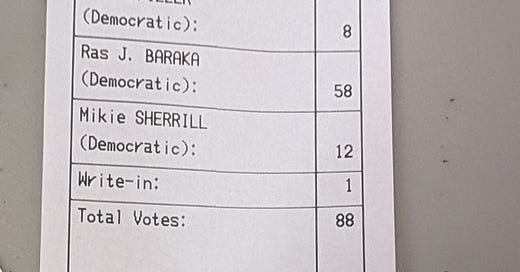June 10th has come and gone, marking a pivotal moment in Bloomfield’s political landscape. Thousands of residents cast their votes in a primary that officially began weeks earlier with the arrival of mail-in ballots in late April. This year’s ballot looked notably different—gone were the traditional county lines that grouped party-endorsed candidates together. Instead, voters faced a more open and competitive field across several races: a hotly contested gubernatorial primary on both sides, a competitive State Assembly race in LD-34, five candidates vying for three Council At-Large seats, and a one-year term contest in the First Ward. Notably, Mayor Jenny Mundell ran unopposed. On the Republican side, there were no town-level candidates on the ballot, meaning Democratic primary winners will likely face only independent challengers in November—one of whom has already filed to run for mayor.
Before diving into the results (note that the election has not been certified yet, two important dynamics shaped this election:
First, although this wasn’t a presidential election year, the primary season saw record-breaking spending and engagement, particularly around the Democratic gubernatorial primary. As noted by New Jersey Globe, more than $120 million was spent on the race, with voters inundated by ads, mailers, emails, and texts. Over one million voters participated statewide—a turnout boost fueled largely by top-ticket competition.
Second, despite this heightened activity, many Bloomfield voters remained unaware of key down-ballot races. Even on Election Day, our team repeatedly encountered voters surprised to learn the mayor was unopposed or unsure of who was running for Town Council.
Statewide Results
In the gubernatorial primary, Mikie Sherrill won the Democratic nomination with 34% of the vote in a crowded six-way race—meaning two-thirds of Democratic voters chose someone else. In Essex County, Newark Mayor Ras Baraka actually outperformed Sherrill in raw vote count. On the Republican side, Jack Ciattarelli won decisively with 68% of the vote.
In the 34th Legislative District, the race for the State Assembly revealed major shifts underway. Carmen T. Morales led with 12,786 votes (33.6%), followed by Bloomfield Mayor Michael Venezia with 10,115 votes (26.6%). Just behind him was Brittany Claybrooks with 9,246 votes (24.3%), and Frank Vélez with 5,933 votes (15.6%).
Despite heavy institutional backing and name recognition, Venezia barely held on to second place—edging out Claybrooks by fewer than 900 votes. The fact that two grassroots candidates with limited funding came this close to unseating an incumbent signals a growing appetite for change.
Local Results: A Community-Driven Challenge
Here in Bloomfield, Bloomfield Democrats for Change ran a people-powered campaign rooted in transparency, fiscal responsibility, and environmental sustainability. I was proud to run alongside Tracy Toler-Phillips and Stefanie Santiago as part of a slate committed to shaking up business-as-usual politics.
Final Results — Bloomfield Council At-Large (Vote for 3):
Monica Charris Tabares — 4,106
Jill Fischman — 3,215
Tracy Toler-Phillips — 3,079 ✅ Elected
Widney Polynice — 2,828
Satenik Margaryan — 2,580
Total Votes Cast: 15,808
First Ward Council Race:
Rosalee Gonzalez — 982 (56.05%)
Stefanie Santiago — 770 (43.95%)
Total Votes Cast: 1,752
Though Bloomfield Democrats for Change didn’t win every seat, we ran a campaign fueled by grassroots energy, small-dollar donations, and unwavering integrity. And we made history: Tracy Toler-Phillips’ victory marks the first time in a decade that a non-party-endorsed candidate has won a Council seat in the primary. Her election means that, at long last, Bloomfield residents will have an independent voice on the Council—someone committed to climate resilience, honest budgeting, and ethical governance.
Stefanie Santiago’s strong showing in the First Ward (44%) underscores the momentum for change and lays the groundwork for future progress. Despite being outspent more than 5-to-1, Bloomfield Democrats for Change proved that real people, not political machines, are the true engine of democracy.
The Mayoral Race: An Empty Victory?
Mayor Jenny Mundell ran unopposed in the Democratic primary. Despite the branding of “Team Mundell,” no one challenged her seat. She received:
628 Early Voting votes
3,804 Election Day votes
1,488 Mail-In votes
Total: 5,920 votes
With 38,983 registered voters in Bloomfield, this means only about 15% of the electorate voted for her in this primary. While 7,986 ballots were submitted, over 2,000 voters deliberately left the mayoral line blank or wrote in someone else’s name. These protest votes speak volumes. Even without a challenger, a significant number of voters chose to reject Mundell. In a system where incumbents typically coast unopposed, this level of pushback raises serious questions about her mandate and popularity.
Looking Ahead
This election was a turning point—not just for Bloomfield, but for progressive movements across New Jersey. Yes, the machine still holds power, but the fractures are growing. We saw them at the state level, the legislative level, and here at home in Bloomfield.




The primary results do signal a growing appetite for change in the democratic party locally.
Too many voters arrived to the polls uninformed.
Others don’t bother to vote out of apathy after so many years of "Vote line A" and uncontested seats can be won with one vote.
For years, our assembly went unchallenged. So it was very disappointing that we did not have a forum for the assembly candidates as attempted this year.
For some reason, the Jersey Bee had to cancel an event that would have been very informative for voters.
A change is gonna come. It has to.